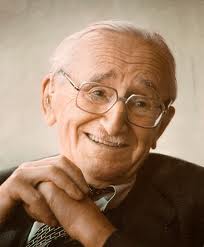Freidrich von August Hayek was an Austrian Economist who was a very known figure in the economics profession until 1950. He was part of Austrian Economics and is also considered the most eminent member of the school of thought.
Hayek was born in 1899 to a family of intellectuals. In 1917, he joined the Austrian-Hungary army and fought on the Italian front. During the war, he suffered damage to the hearing in his left ear. After the war, like many youths those days, Hayek wanted to find the reason behind the happenings of wars and ways to stop them. Socialism seemed to him to be an option but the seminar of Ludwig von Mises and his book Socialism had an immense impact on him. Hayek was a student of Friedrich von Wieser at the University of Vienna and Wieser recommended Mises to hire Hayek in 1921. Hayek worked under Mises and in the year 1927 Mises helped him establish the Austrian Institute for Business Cycle Research.
In 1929, Hayek’s first book Monetary Theory and the Trade Cycle was published where Hayek used the concept of Wicksell-Mises to build the Business Cycle theory and considered it to not be natural but an artificial boom created by the central bank by reducing the interest rates (or market interest rates below the real interest rates).
England, the capital of economics those days was seeing the rise of Keynes. Keynes was a popular personality who was known to divert public opinion with the help of his pen. Seeing the rise and increasing dominance of Cambridge professor Keynes, the London School of Economics needed someone who could challenge Lord Keynes. Hayek arrived at the LSE and impressed the professors there. In 1930, Keynes published The Treatise of Money which Hayek pointed out flaws in the work. But, later Keynes escaped from the critique by saying that he no longer believes in his work and is focused on writing his other book. Hayek published his other book Prices and Production in which he proposed his Hayekian Triangle.
Hayek was a technical economist in the first half of the 20th century and his works were highly cited too but in mainstream economics, he was known for his works in Political Economy. No write up on Hayek can go without mentioning his bestseller The Road to Serfdom. This book was a critique of authoritarianism and collectivism. Hayek disproves that Socialism gives freedom, he disproves planning works better than markets, he disproves democracy would be any help in socialism, he disproves the belief that Fascism/Nazism is any close or a result of Liberalism/Libertarianism, he disproves totalitarianism and he disproves collectivism. In every way possible, Hayek broke the concept of collectivism. This is one of the major reasons why socialist concepts aren’t considered part of economics.
Hayek also highlights the issues with intellectuals who can be dangerous to a free society. His “knowledge problem” in society was another work very much accepted in mainstream economics. The problem says that a single planner or a group of planners cannot have all the knowledge in society as this “tacit” knowledge is dispersed in society and decentralized planning or planning at the individual level is needed rather than a planning commission. These knowledge are required to make important decisions in an economy. He said that prices transfer knowledge and to let it happen there is a need for a flexible and free price system. The free market for Hayek was a system of non-intervened or non-altered prices. Hayek used this concept to join Mises in a popular debate of that era called the Economic Calculation Debate.
Keynes is a major figure in economic history and Hayek was his rival. Both found very little common ground. Keynes was firm to his ground on the Demand side whereas Hayek continued the old belief of the Supply side. Being great rivals both turned out to become great friends later too. It was regarded that Hayek lost the battle. Keynes was considered the “savior of capitalism”. After 1950, Hayek shifted to other fields like Psychology, Political Philosophy, Philosophy of Science, and Jurispendence. Keynesian Revolution brought a bad phase for the Austrian School of thought and it was on the verge of extinction.
But, Hayek didn’t stop and kept publishing some very notable works in different fields of social science. Hayek who was seen as a loser saw the fall the Keynesian economics after the Stagflation of the 70s, he won Nobel Prize in 1974 and his Nobel Lecture The Pretense of Knowledge is the second most cited lecture in economics. The socialist countries began falling as planning couldn’t work as it was expected and Hayek could witness many socialist nations including India liberalizing and adopting capitalistic values. Most importantly he was alive during the fall of the Soviet Union.
Winning Nobel Prize motivated him to come back to Economics. He proposed a system of privatized money where banks or private firms can issue their own currency challenging the monopoly of the Central bank. This work even though very much ignored in the late 70s was later seen to be practical with the invention of Cryptocurrency.
First, Hayek alongside his mentor and colleague Mises defended individual liberty and the free market system and later alongside Friedman made a major impact on the thinking of the masses and many political leaders too. F.A. Hayek was a pure genius in Social Science who has been sidelined by media and politicians for a long period of time. Hayek was different from others, he described himself as a Classical liberal and neither the Political/Economic Right nor Left agrees with his work completely.
No matter the type of system a country adopts, Hayek is the man who can never be ignored.



